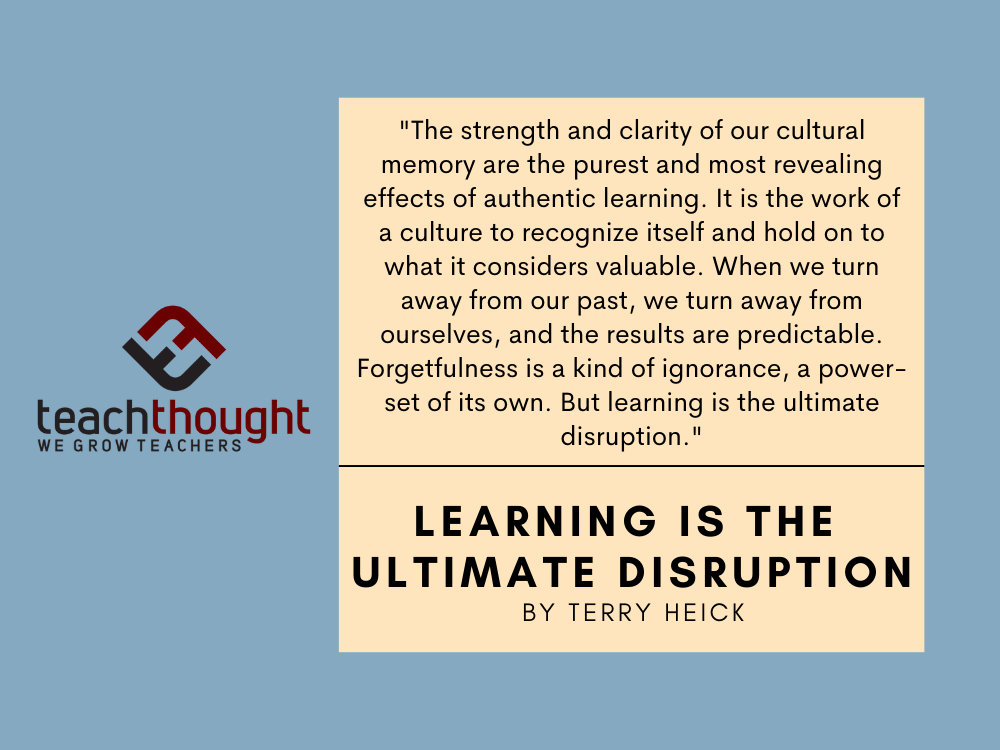
Why Learning Is The Ultimate Disruption
It is the work of a school to join members of a community to one another.
That this doesn’t happen naturally isn’t surprising. Matters of curriculum, instruction, and assessment are often alien to the home, the life, and the natural thought processes of most students. Academics are a different kind of language than people speak naturally. Teachers, units, tests, behavior plans, attendance rosters, proficiency, standards, letter grades (and alternatives to letter grades), edtech, and more are the collective tools and jargon of education.
Yet, these end up being the very same terms we use to communicate learning success with and through. This naturally brings the school into conflict with the home, and vice-versa, so that they seem constantly at odds. The underlying assumption, I assume, of content standards is that if students master them, their lives will be improved.
This is usually framed under the ‘college and career readiness’ slogan, four words that describe why students should go to school and what they’re preparing for while doing so. What, then, is the most ideal relationship between the student and the curriculum? What should curriculum ‘do’ for a student?
What should learning alter, question, or produce?
Ferguson, Missouri
The events in Ferguson, Missouri, of suffering and gnashing of teeth and collective failure, were entirely predictable. Continuing a pattern surfacing most recently in Compton in 1992, Detroit of 1967, Watts in 1965, et al. These aren’t ‘cultural events’ or ‘teachable moments,’ but, shared failures of pedagogy and curriculum.
Think about it. What in your current curriculum, as it exists now, would keep ‘Ferguson’ from happening again? (Edit: years later, the Black Lives Matter movement, among others, would occur). And not the ‘civil unrest’ part, but the conditions that seem to demand it? If what we teach doesn’t, by design, erode the circumstances that lead to racism, ecological disasters, religious intolerance, the collapse of financial markets, poverty, child trafficking, bullying, or any of our most recent challenges, are we okay with that?
This isn’t about teaching social justice as a class, but rather shifting the what and the why of student learning. An introspective education speaks naturally disruption to Ferguson on equal terms. The best learning is organically preemptive. Our cultural failures are failures of memory.
Teaching For Cultural Memory
If culture refers to the practices and patterns of a group of people that share a place, time, heritage, or other fundamentally human thing, then cultural memory would be the tendency and capacity to recall those events within those spaces that brought us all collectively to where we are today. Ferguson happens when our cultural memory fails; our cultural memory fails when we turn away from one another.
Legacy is a pattern of remembering, retracing, and reinforcing what brought us here, with whom, and how we might best use this space and our skills and experience to do our best work. Literature, art, history, husbandry, land use, agriculture, architecture, music, food, family place, and more are all acts of reflection. Our capacity and tendency for such reflection directly through storytelling and traditions are acts of communal reflection.
Culture.
What We Know & What We Do With What We Know
Sources of authority and self-image; images of race, and image of one’s self as a member of that race; a sense of history, and a sense of one’s place in that history–these are terms that education deals with whether it does so by design or not. Curriculum and learning models; what they learn and how they learn it. One is important as a matter of knowledge, the other a matter of practice.
On a cultural level, this becomes what we know, and what we do with what we know. Culture, then, isn’t just a ‘part’ of learning, or some nebulous background for understanding. When learning doesn’t grow from cultural positions, historical terms become ahistorical omissions, literature becomes mere stories, and math becomes a non-stop sequence of skills of dubious value, all gathered beneath the Cheshire Cat grin of academia.
It is challenging to design learning experiences that bring people closer together and help a student realize their truest self. The relation, currently, between schools and communities is unclear. If this is true, then education isn’t broken, as we keep thinking, but what is broken is our collective image of what education is.
The strength and clarity of our cultural memory are the purest and most revealing effects of authentic learning. It is the work of a culture to recognize itself and hold on to what it considers valuable. When we turn away from our past, we turn away from ourselves, and the results are predictable.
Forgetfulness is a kind of ignorance, a power-set of its own.
But learning is the ultimate disruption.
Learning Is The Ultimate Disruption
